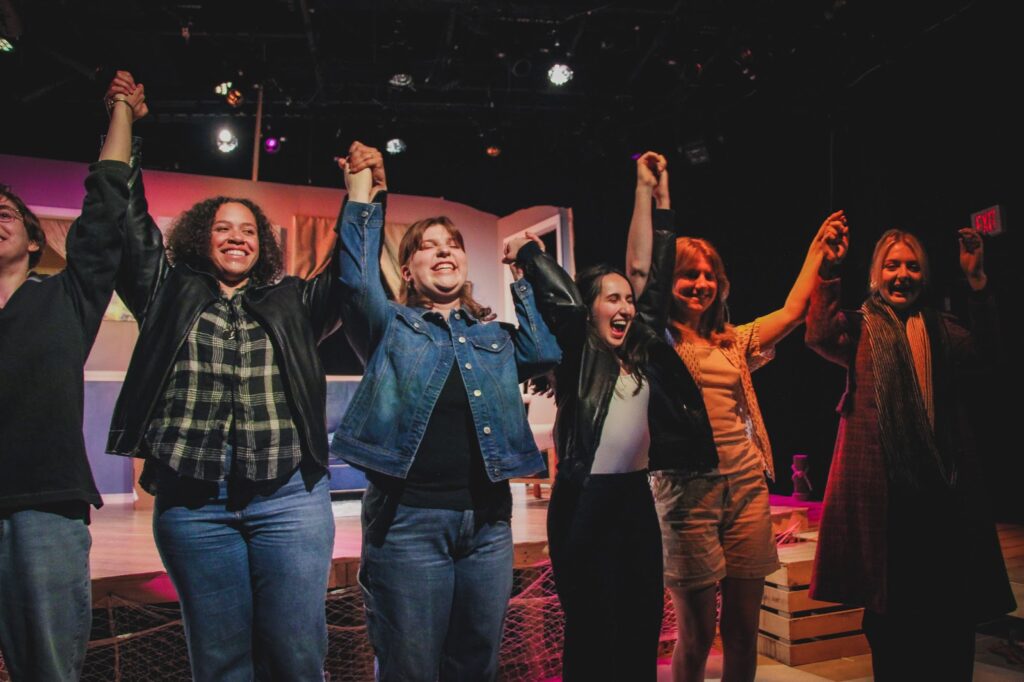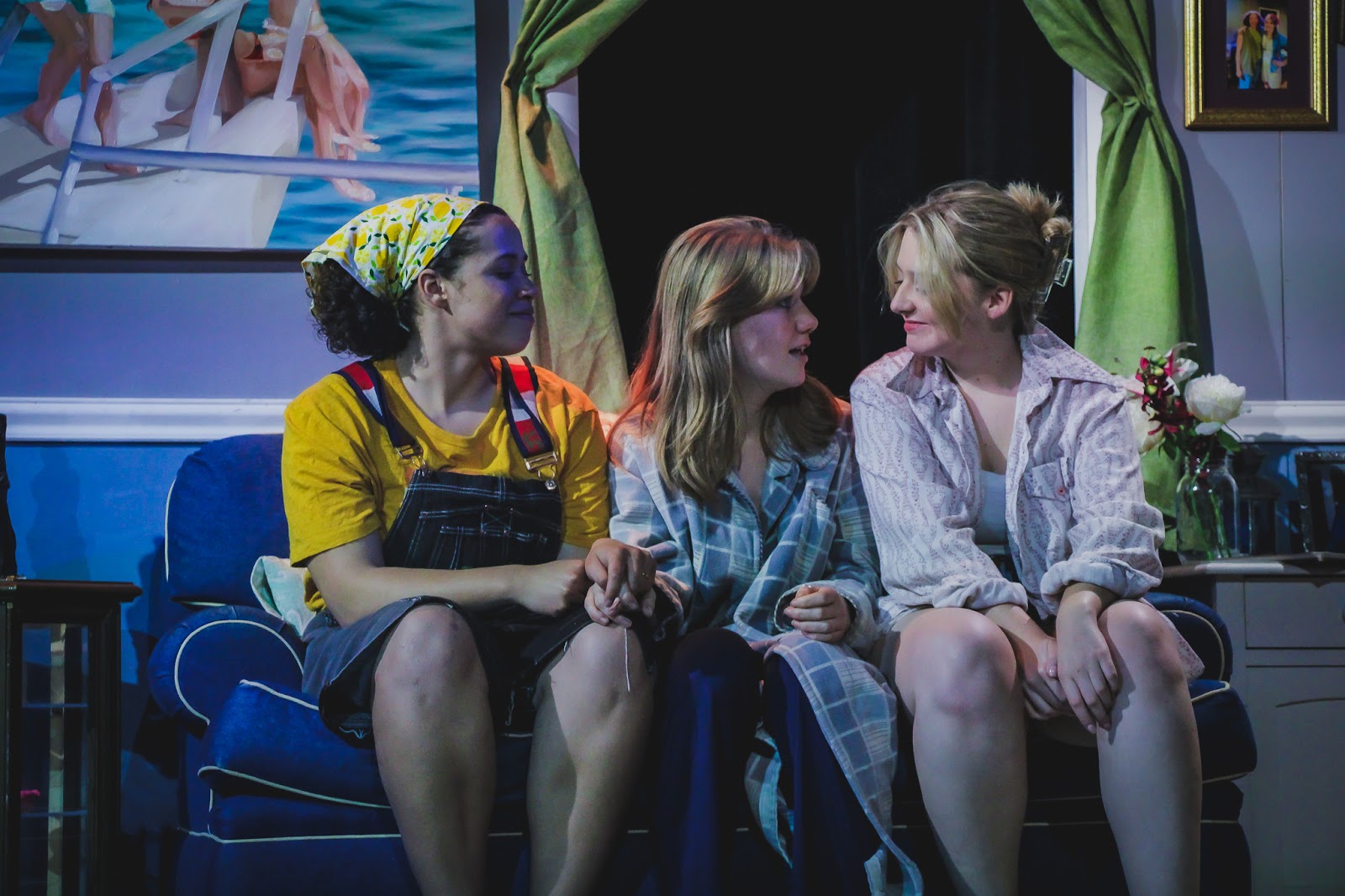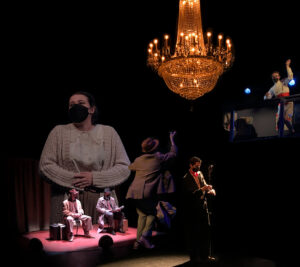From April 19th to 23rd, Georgetown’s own Village C Theatre transformed into a beach house bustling with rich characters and carefully curated set pieces for Nomadic Theatre’s latest production. Complete with a cozy coastal color scheme of misty teal blues and seafoam greens, set designer Olivia Martin (CAS ’23) crafts a summery and inviting ambiance. But despite its sunshiney exterior, there’s much more bubbling beneath the surface in Bluefish Cove.
Grappling with complex platonic and romantic relationships, queer identity, and mortality among other weighty subjects, this play holds up a magnifying glass to the emotional inner workings of life in an exclusively lesbian seaside town in ’80s Long Island. Every summer, the women of Bluefish Cove return to let down their guard and embrace their queer identities without fear of persecution, shame, or misunderstanding—a hard-won comfortability that makes the unexpected arrival of an initially straight-presenting woman all the more threatening. Though Last Summer at Bluefish Cove is a story simmering in syrupy, summertime sadness, it is also one that celebrates the strength of the lesbian community on both an individual and collective level.
While there were over 200 lesbian bars in the United States in the early ’80s, the era in which playwright Jane Chambers’ groundbreaking Bluefish Cove is set, only 27 lesbian bars exist nationwide to date. Hiruni Herat (CAS ’23), director of Nomadic Theatre’s production, calls attention to this dramatic decrease in their director’s note, inviting the audience to consider how this modern background of shrinking spaces for queer women renders this story even more special; Last Summer at Bluefish Cove revels in the sacred nature of protected spaces for marginalized communities. While Bluefish Cove protects its community through its exclusivity, this exclusivity does not apply to the audience—we are entrusted with full access to the town’s happenings without hesitation.
The show opens on protagonist Lillian “Lil” Zalinski (Marre Gaffigan, CAS ’26) fishing on the dock next to her beloved summer house. Amidst Lil’s uncharacteristically fruitless fishing excursion, another woman reading a book entitled The Female Sexual Imperative perches on a chair a few paces away. It doesn’t take long for conversation to spark. At first, their chance encounter feels flirtatious to Lil and audience members alike, but Lil ultimately realizes the woman, Eva Margolis (Sabrina Perez, CAS ’24) does not identify as a lesbian and unknowingly fled to this community after leaving her controlling husband of twelve years. Gaffigan wordlessly conveys their character’s confusion with effortless comedic flair, while Perez captures Eva’s cluelessness to a similarly humorous result. This opening succeeds not only through Gaffigan and Perez’s sharp performances, which demonstrate a deep understanding of their characters but also by establishing the recurring theme of miscommunication and familiarizing the audience with the show’s slow-moving scene style.
Before Lil has the chance to hear the full story of Eva’s arrival, Lil invites her to a dinner party with the rest of Bluefish Cove’s seasonal inhabitants. The guest list includes Annie (Caitlin Frazier, CAS ’23), Lil’s best friend since college, Annie’s partner Rae (Sophie Maretz, CAS ’26), Dr. Kitty Cochrane (Jameson Nowlan, SFS ’23), and Kitty’s girlfriend-slash-secretary Rita (Aileen Kim, CAS ’25). Kitty is Lil’s ex and the author of The Female Sexual Imperative, the book which has become a manifesto for Eva’s newfound foray into feminism post-breakup. Prior to Eva’s knock on the door, the group considers telling her the truth about their town, but they ultimately decide to conceal their sexualities—Kitty fears being publicly outed beyond the cove, something which could jeopardize her burgeoning literary career.
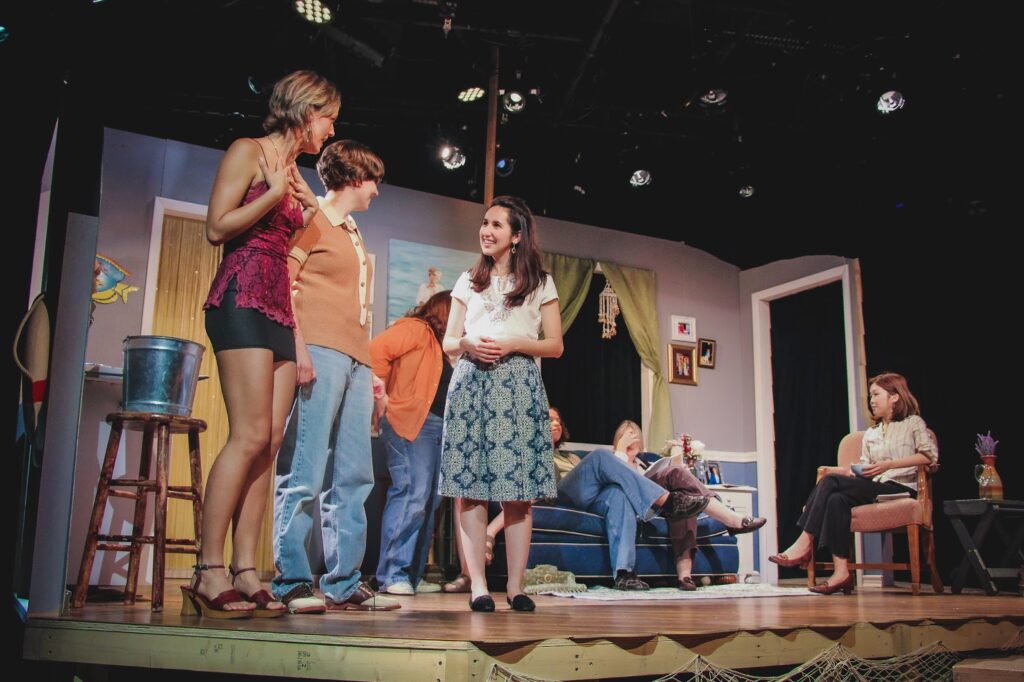
L to R: Donna (Meger) and Sue (Smith) greet Eva (Perez) at a dinner party.
By introducing the remainder of the cast in this second scene as a group rather than individually, the show highlights that the women of Bluefish Cove are a mosaic; the emotional interplay of this ensemble is most compelling when all of these unique characters come together. Lil is unquestionably at the center of this tangled social web: she was romantically involved with Kitty, cheated on her with Donna, and her steadfast, purely platonic friendship with Annie is the group’s subtle yet undeniable backbone. “Alley Cat” Lil’s presence looms large among this shoreline, embedding the unpredictability of her fate with even more weight.
As soon as Eva shows up, a series of hilarious, painfully awkward faux pas ensue, with the worst of all involving Eva mistaking the late arrivals Sue (Mel Smith, CAS ’23) and her Lil-obsessed partner Donna (Lexie Meger, SON ’24) for mother and daughter rather than a couple. This disastrous error descends the party into chaos, prompting Lil to finally come clean; Eva is accepting yet utterly embarrassed. Though cringe-inducing, the scene is a source of much-needed levity amidst a play that heavily leans toward serious, despondent subject matter.
While Lil is ultimately honest with Eva about Bluefish Cove, there is one secret all of her other friends know which she still conceals from the newcomer: Lil is terminally ill with cancer and her condition is rapidly deteriorating. Her worsening health contributes to an overarching sense of immobility within this story. While Lil feels constricted by her limited time, Sue feels constrained within her unhealthy relationship with Donna, Kitty is terrified of being openly gay outside of Bluefish Cove, and Annie is haunted by the thought of life without her best friend. This claustrophobia is further emphasized through the stagnant single setting of the beach house which makes each character’s problems feel inescapable and all-surrounding. Cleverly, the cove is simultaneously a place of liberation and constriction. The impending arrival of autumn signals an incoming departure from the community Bluefish Cove offers, engendering a source of stress for the characters.
Lil’s looming mortality becomes all the more devastating when Eva reveals her romantic feelings for Lil at the end of Act I. Initially, Lil argues Eva is simply “lonely and vulnerable and curious” in a late-night conversation peppered with long pauses mirroring the grogginess of an intimate conversation in the early hours of the morning. However, despite preliminary reservations, Eva ultimately assures Lil that her feelings extend far beyond just curiosity. Perez and Gaffigan deliver a mesmerizing, intimate performance in this tension-filled tango which ends just short of a fate-sealing kiss. Though many other scenes in Bluefish Cove are characterized by mellow melancholy, this scene sizzles with the promise of new beginnings.
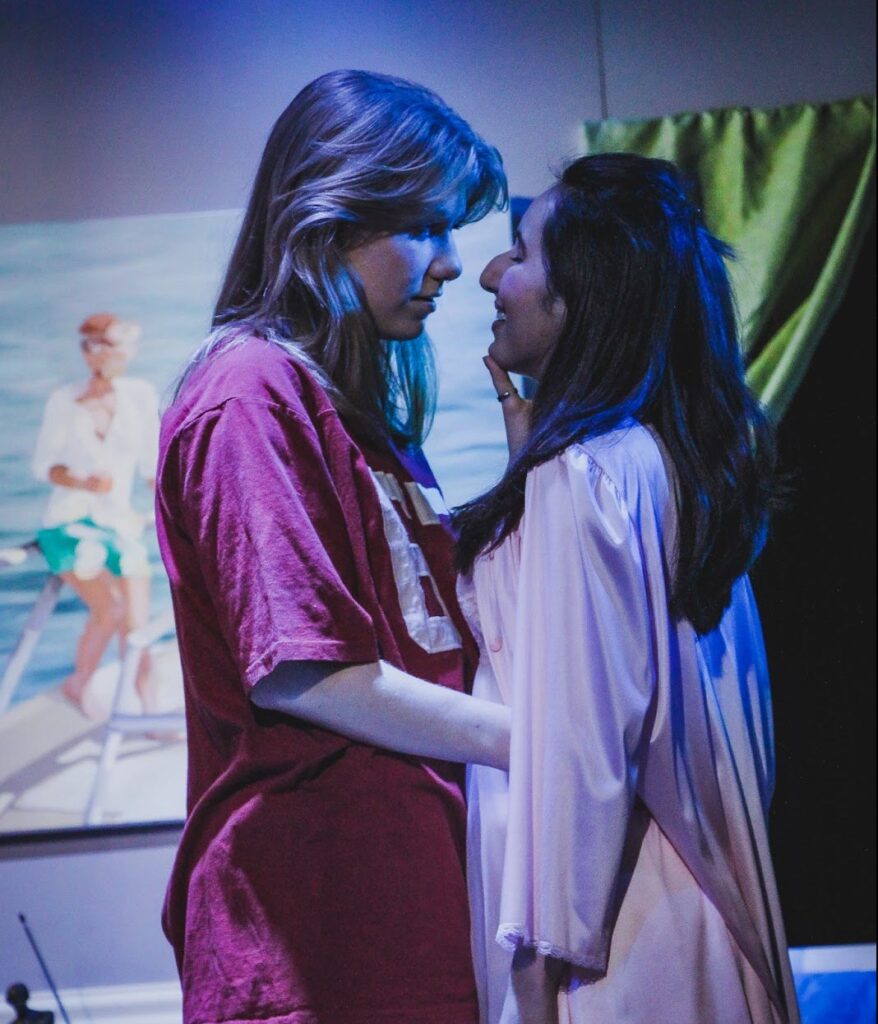
Lil and Eva exchange a late night confession.
Bluefish Cove doesn’t give us much time to relish in this hope, as Lil’s condition continues to deteriorate. In her stubborn desire to go “wanting to live, not wishing I were dead,” she refuses treatment for her cancer, despite Annie and Kitty’s best efforts to change her mind.” Though it may be easy to misconstrue her choice as “giving up,” echoing the claims of Kitty and Annie, there are scratch marks on her goodbye; this “Alley Cat” clings to life until the bitter end. She might not have sculptures like Annie, children like Rae, or writing like Kitty to leave behind as her legacy, a point she struggles with in trying to come to terms with her fate, but Lil ultimately accepts that her legacy, though intangible, will be the indelible marks she has left on those around her. Though Lil’s untimely demise is understandably difficult for her to accept (she even heartbreakingly deludes herself into believing fresh romance has altogether healed her for the first half of Act II), ultimately, acknowledging that her days are numbers offers her a bittersweet gift: the chance to say a proper goodbye. Gaffigan’s delivery never felt over-polished or over-practiced. Rather than diluting the forcefulness of the emotions that come with Chambers’ heart-wrenching lines, Gaffigan embraces a more instinctual, realistic style of acting which makes Lil’s grief for her non-existent future palpable.
After Kitty and Annie have the chance to say farewell to their beloved companion, Lil must face the person who has complicated her decision to resist treatment the most: Eva. Amidst their lover’s goodbye, Lil painfully envisions another newcomer, like Eva, coming to live in her beach house next summer. This devastating crescendo of the show features a poignant, tear-filled embrace between the two women, complete with a moving instrumental rendition of “Back to the Old House” by The Smiths. The soulful strings of the track round out this somber scene as Lil breaks the embrace, meanders over to the dock where we first met her, and hops into the water—a metaphorical demonstration of her passing. For those familiar with this tune from The Smiths, the lyrics, though unspoken, cannot help but ring in your head, aligning seamlessly with the story at hand: “I would love to go / Back to the old house / But I never will.”
The show concludes with a chilly scene of the Bluefish Cove women returning to the house in the heart of winter, packing up Lil’s house, and preparing for what lies ahead. Her death still reverberates amongst her loved ones; and yet, the ending is an oddly hopeful one—all of the women are determined to live their lives to the fullest more so now than ever before.
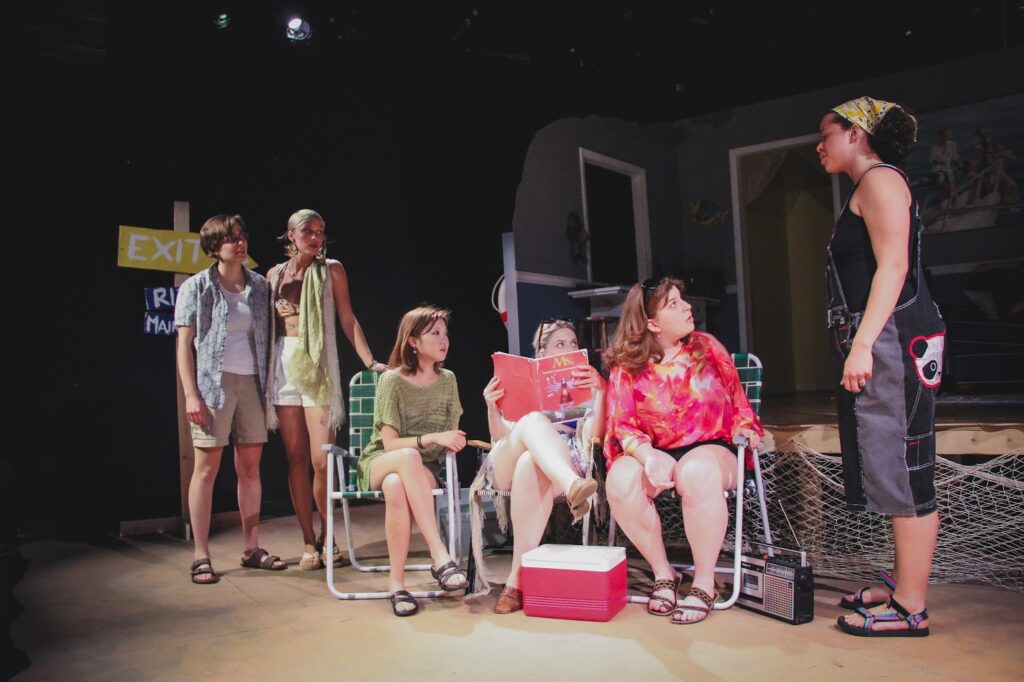
L to R: Sue (Smith), Donna (Meger), Rita (Kim), Kitty (Nowlan), Rae (Maretz), and Annie (Frazier) discuss Lil’s worsening condition.
As Eva stands center stage, empowered to embark on more adventures and continue pursuing independence, her final words—and the last of the play—reaffirm that she is capable of weathering this storm all by herself. Perez strikes a perfect balance between sadness and satisfying self-confidence in her delivery of this line, bringing the production to a close on a powerful emotional note. Far from the floundering, frazzled woman we met in the first scene, uncertain as to what her newly single life might look like, the Eva we say goodbye to is solemn yet solid in her path forward, having come out and come into her own. Thanks to Lil, Eva has discovered how to be authentically herself; her inspirational metamorphosis is undoubtedly Lil’s greatest legacy.
By final bows, the audience feels wholeheartedly invested in every character on stage, and equally crushed by Lil’s untimely death, especially thanks to the naturalism Gaffigan brought to their performance. While this story is sure to linger with you long after it ends, rather than leaving an unsightly scar, Last Summer at Bluefish Cove places a forget-me-not tucked behind your ear: a tender yet persistent reminder of how the show’s heartbreak should push us to make every day with the people we love count. As Lil told us earlier, “Bluefish Cove is more than just a lesbian beach colony. It’s family”—and if there’s one thing we can never have enough of from our families, whether blood-related or chosen, it’s time.
